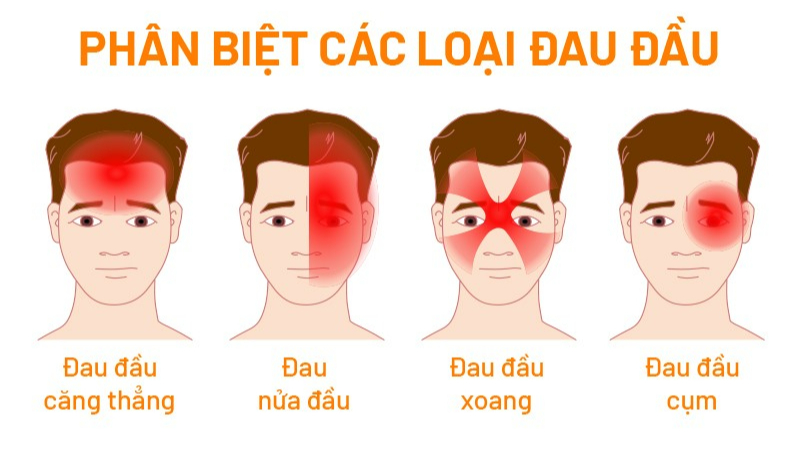How is a tension headache different from other types of headaches?
Unlike other types of headaches, such as migraines, sinus headaches, or cluster headaches, tension headaches can cause pain in the head, scalp, neck, and shoulders. They are often caused by stress, fatigue, poor posture, or dehydration.
Tension headaches are often described as a constant pressure or tightness around the forehead or back of the head and neck, feeling like a tight band is squeezing the head.
According to a study published in the journal MedicinePlus, tension headaches are typically mild to moderate in intensity and can be episodic or chronic.

Common types and locations of headaches.
Causes of tension headaches
- Stress: Stress negatively impacts sleep habits and can aggravate headaches. Over time, repeated tension headaches can lead to chronic pain and discomfort.
- Poor posture: Sitting or standing for long periods of time in an improper position such as slouching or pulling the neck back can strain the muscles in the neck and shoulders, which can cause tension headaches. Over time, this prolonged tension can lead to discomfort, often manifesting as headaches. Additionally, poor posture can compress the nerves in the neck, causing pain and discomfort.
- Eye strain: Eye strain is often caused by using a computer or monitor for long periods of time, which can cause tension headaches.
Additionally, lack of sleep, hunger, or dehydration can all cause tension headaches.
How to Prevent Tension Headaches
Stress Relief
To reduce stress, you can practice mindfulness meditation techniques, box breathing, and do temple and head relaxation exercises to reduce the likelihood of tension headaches.
Practice physical activity
Participate in physical activity for at least 30 minutes a day or at least 150 minutes a week. This helps improve the movement of fluids in the body including hydration, eliminates toxins through sweat and urine, lubricates joints, muscles and nerves, and improves blood circulation.
Furthermore, when performing physical activities such as walking, swimming, yoga, Pilates... the body will release endorphins, natural pain relievers that help reduce headaches caused by stress.
Keep your body hydrated
Make sure you drink at least two liters of water throughout the day. Dehydration is one of the most common causes of tension headaches.
You can drink water in the form of boiled water or water mixed with cucumber slices, tangerine, mint… or herbal teas such as chamomile tea or peppermint tea, which have a soothing and hydrating effect. Avoid too much caffeine, as it can lead to dehydration and cause headaches.
Get enough sleep
Make sure to get at least 7-9 hours of sleep each night and practice good sleep hygiene, such as sleeping in a cool, dark, quiet environment.

Getting enough sleep is an effective way to relieve tension headaches.
Keep good posture
Sitting comfortably and properly is important to maintain good posture and prevent tension headaches.
If you work at a desk, it is essential to take regular breaks to prevent muscle strain. Every 30 minutes, get up from your chair and walk briskly for 3 minutes to help relax your muscles and relieve tension in your neck and shoulders.
Adjust your chair or desk so that the top of your computer screen is at eye level to prevent neck strain and reduce tension headaches.
Use essential oils
Essential oils can be a natural and effective way to relieve tension headaches. Many essential oils have soothing and pain-relieving properties. You can apply peppermint oil to your temples to create a cooling sensation and promote relaxation. Lavender oil can also help reduce stress and promote a sense of calm, potentially preventing headaches.
However, always remember to dilute essential oils with a carrier oil before applying to the skin to prevent irritation.
Warm or cold compress
Both heat and cold therapy can help relieve tension headaches by working on the muscles in the head and neck.
Warm heat helps relax tense muscles, increase blood flow, and relieve pain. This therapy is especially beneficial for people with muscle tension, which is a major cause of headaches.
Cold therapy, on the other hand, can help numb the area and reduce inflammation, which is effective for headaches accompanied by swelling or pain.
Source: https://giadinh.suckhoedoisong.vn/7-cach-don-gian-ngan-ngua-dau-dau-do-cang-thang-172240919161053375.htm
































































































![[Infographic] In 2025, 47 products will achieve national OCOP](https://vphoto.vietnam.vn/thumb/402x226/vietnam/resource/IMAGE/2025/7/16/5d672398b0744db3ab920e05db8e5b7d)







Comment (0)